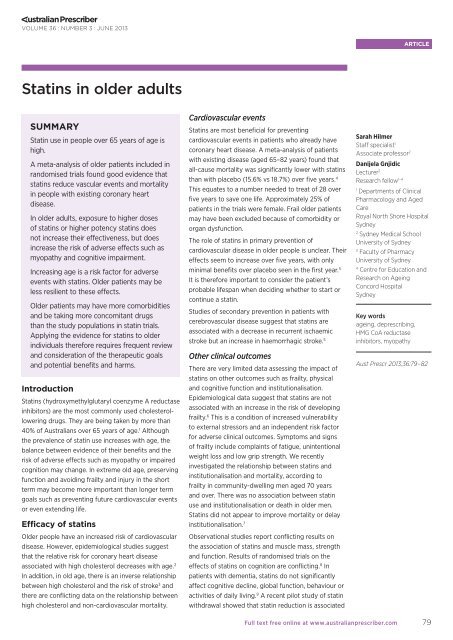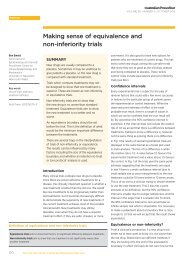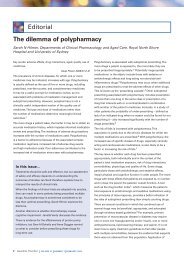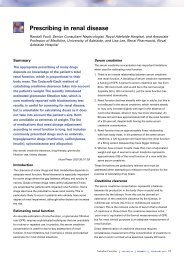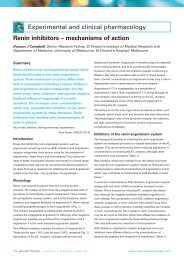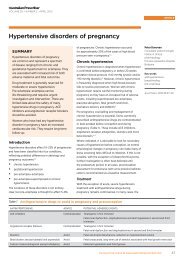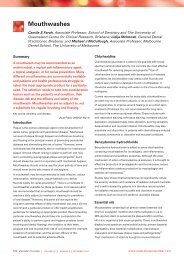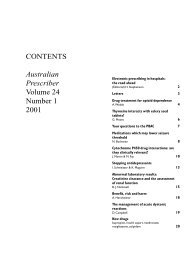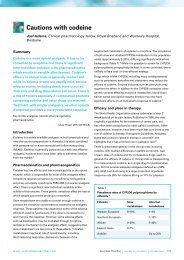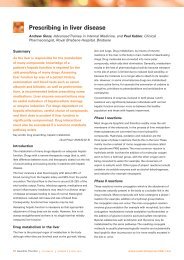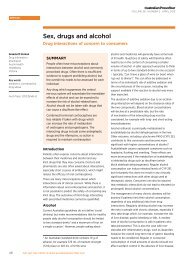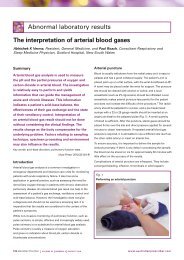download the full PDF issue - Australian Prescriber
download the full PDF issue - Australian Prescriber
download the full PDF issue - Australian Prescriber
Create successful ePaper yourself
Turn your PDF publications into a flip-book with our unique Google optimized e-Paper software.
VOLUME 36 : NUMBER 3 : JUNE 2013<br />
ARTICLE<br />
Statins in older adults<br />
SUMMARY<br />
Statin use in people over 65 years of age is<br />
high.<br />
A meta-analysis of older patients included in<br />
randomised trials found good evidence that<br />
statins reduce vascular events and mortality<br />
in people with existing coronary heart<br />
disease.<br />
In older adults, exposure to higher doses<br />
of statins or higher potency statins does<br />
not increase <strong>the</strong>ir effectiveness, but does<br />
increase <strong>the</strong> risk of adverse effects such as<br />
myopathy and cognitive impairment.<br />
Increasing age is a risk factor for adverse<br />
events with statins. Older patients may be<br />
less resilient to <strong>the</strong>se effects.<br />
Older patients may have more comorbidities<br />
and be taking more concomitant drugs<br />
than <strong>the</strong> study populations in statin trials.<br />
Applying <strong>the</strong> evidence for statins to older<br />
individuals <strong>the</strong>refore requires frequent review<br />
and consideration of <strong>the</strong> <strong>the</strong>rapeutic goals<br />
and potential benefits and harms.<br />
Introduction<br />
Statins (hydroxymethylglutaryl coenzyme A reductase<br />
inhibitors) are <strong>the</strong> most commonly used cholesterollowering<br />
drugs. They are being taken by more than<br />
40% of <strong>Australian</strong>s over 65 years of age. 1 Although<br />
<strong>the</strong> prevalence of statin use increases with age, <strong>the</strong><br />
balance between evidence of <strong>the</strong>ir benefits and <strong>the</strong><br />
risk of adverse effects such as myopathy or impaired<br />
cognition may change. In extreme old age, preserving<br />
function and avoiding frailty and injury in <strong>the</strong> short<br />
term may become more important than longer term<br />
goals such as preventing future cardiovascular events<br />
or even extending life.<br />
Efficacy of statins<br />
Older people have an increased risk of cardiovascular<br />
disease. However, epidemiological studies suggest<br />
that <strong>the</strong> relative risk for coronary heart disease<br />
associated with high cholesterol decreases with age. 2<br />
In addition, in old age, <strong>the</strong>re is an inverse relationship<br />
between high cholesterol and <strong>the</strong> risk of stroke 3 and<br />
<strong>the</strong>re are conflicting data on <strong>the</strong> relationship between<br />
high cholesterol and non-cardiovascular mortality.<br />
Cardiovascular events<br />
Statins are most beneficial for preventing<br />
cardiovascular events in patients who already have<br />
coronary heart disease. A meta-analysis of patients<br />
with existing disease (aged 65–82 years) found that<br />
all-cause mortality was significantly lower with statins<br />
than with placebo (15.6% vs 18.7%) over five years. 4<br />
This equates to a number needed to treat of 28 over<br />
five years to save one life. Approximately 25% of<br />
patients in <strong>the</strong> trials were female. Frail older patients<br />
may have been excluded because of comorbidity or<br />
organ dysfunction.<br />
The role of statins in primary prevention of<br />
cardiovascular disease in older people is unclear. Their<br />
effects seem to increase over five years, with only<br />
minimal benefits over placebo seen in <strong>the</strong> first year. 5<br />
It is <strong>the</strong>refore important to consider <strong>the</strong> patient’s<br />
probable lifespan when deciding whe<strong>the</strong>r to start or<br />
continue a statin.<br />
Studies of secondary prevention in patients with<br />
cerebrovascular disease suggest that statins are<br />
associated with a decrease in recurrent ischaemic<br />
stroke but an increase in haemorrhagic stroke. 5<br />
O<strong>the</strong>r clinical outcomes<br />
There are very limited data assessing <strong>the</strong> impact of<br />
statins on o<strong>the</strong>r outcomes such as frailty, physical<br />
and cognitive function and institutionalisation.<br />
Epidemiological data suggest that statins are not<br />
associated with an increase in <strong>the</strong> risk of developing<br />
frailty. 6 This is a condition of increased vulnerability<br />
to external stressors and an independent risk factor<br />
for adverse clinical outcomes. Symptoms and signs<br />
of frailty include complaints of fatigue, unintentional<br />
weight loss and low grip strength. We recently<br />
investigated <strong>the</strong> relationship between statins and<br />
institutionalisation and mortality, according to<br />
frailty in community-dwelling men aged 70 years<br />
and over. There was no association between statin<br />
use and institutionalisation or death in older men.<br />
Statins did not appear to improve mortality or delay<br />
institutionalisation. 7<br />
Observational studies report conflicting results on<br />
<strong>the</strong> association of statins and muscle mass, strength<br />
and function. Results of randomised trials on <strong>the</strong><br />
effects of statins on cognition are conflicting. 8 In<br />
patients with dementia, statins do not significantly<br />
affect cognitive decline, global function, behaviour or<br />
activities of daily living. 9 A recent pilot study of statin<br />
withdrawal showed that statin reduction is associated<br />
Sarah Hilmer<br />
Staff specialist 1<br />
Associate professor 2<br />
Danijela Gnjidic<br />
Lecturer 3<br />
Research fellow 1–4<br />
1<br />
Departments of Clinical<br />
Pharmacology and Aged<br />
Care<br />
Royal North Shore Hospital<br />
Sydney<br />
2<br />
Sydney Medical School<br />
University of Sydney<br />
3<br />
Faculty of Pharmacy<br />
University of Sydney<br />
4<br />
Centre for Education and<br />
Research on Ageing<br />
Concord Hospital<br />
Sydney<br />
Key words<br />
ageing, deprescribing,<br />
HMG CoA reductase<br />
inhibitors, myopathy<br />
Aust Prescr 2013;36:79–82<br />
Full text free online at www.australianprescriber.com<br />
79


